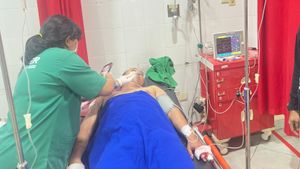JAKARTA - Antiviral drugs designed to treat COVID-19 can cause mutations in viruses that spread in the community, according to a new study.
Molnupiravir, one of the first corona antiviral drugs available during the pandemic, was widely adopted in many countries, including the UK, which was the first country to approve it.
The drug is included in a class of drugs designed to mutate the virus in such a way that it becomes weak and unable to replicate.
However, scientists who have been monitoring COVID have recently found changes to the virus that look very different from mutation patterns in general. They found that the changes, which increased in 2022 when the drug was first introduced, were "deeply related" to people wearing molnupiravir.
Theo Sanderson, lead author and postdoctoral researcher at the Francis Crick Institute, told The National the discovery would be useful in assessing the drug's "risk and benefits".
"Our data does not measure what risk means," he said, launching The National News September 25.
"This is quite difficult to predict. However, our data shows, this treatment can produce a virus that mutates significantly and can survive. This is a useful discovery," he explained.
"There are several viruses that survive the treatment with a number of significant mutations," said Sanderson.
Furthermore, he said, the process is different from what happens when bacteria develop resistance to antibiotics.
"(In this case, molnupiravir) specifically acts to create mutations, while in antibiotics there are spontaneous mutations that provide resistance to these antibiotics," he explained.
Nevertheless, he said antiviral drugs were still needed, as some people struggled to eradicate the virus and became very sick by it.
"The possibility of mutations caused by antivirals needs to be taken into account in the development of new drugs that work in the same way," he said.
"Our work shows that a series of unprecedented post-pandemic data, which is built collaboratively by thousands of researchers and health workers around the world, creates great powers to uncover insights into the evolution of the virus that is unlikely to be done through data analysis from any country," he explained.
A study conducted by researchers at the Francis Crick Institute, University of Cambridge, Imperial College London, University of Liverpool, University of Cape Town and the UKHSA, also found mutations more likely to occur at an older age.
"Molnupiravir is one of a number of drugs used to fight COVID-19," said Christopher Ruis of the Cambridge University Department of Medicine, who was involved in the study.
"But what we found was that in some patients, this process did not kill all viruses and some mutated viruses could spread," he said.
In the UK, researchers analyzed treatment data and found that at least 30 percent of events involved using molnupiravir.
The researchers say that although the drug is not immediately dangerous for people who use it, this research may have important implications for the future pandemic.
اقرأ أيضا:
To study how mutations occur, scientists see signs of their mutation, namely preferences for mutations to occur at certain points in the virus. The researchers involved in the study said there was a close match between the visible signatures in mutation events and the signs in the clinical trial of molnupiravir.
They also see signs of further transmission from one person to another, although there is currently no variant of concern associated with this.
According to experts, it is also important to consider chronic COVID infections, caused by the use of molnupiravir, can lead to new mutations.
The English, Chinese, Japanese, Arabic, and French versions are automatically generated by the AI. So there may still be inaccuracies in translating, please always see Indonesian as our main language. (system supported by DigitalSiber.id)


















